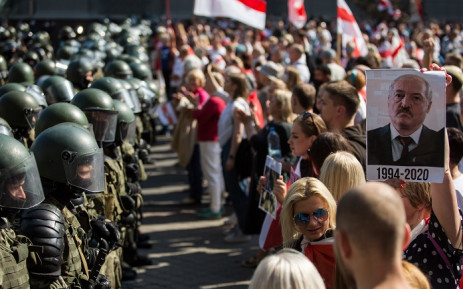
UN steps up pressure over Belarus violence
UN rights chief Michelle Bachelet said there were hundreds of allegations of torture or ill-treatment, including of children, stemming from the response to protests over the disputed re-election of Lukashenko as president of Belarus.
by AFPGENEVA - Torture allegations against Belarusian security forces during a recent crackdown on protesters must be investigated, the UN rights chief said on Monday, turning up the pressure on strongman Alexander Lukashenko.
Michelle Bachelet said there were hundreds of allegations of torture or ill-treatment, including of children, stemming from the response to protests over the disputed re-election of Lukashenko as president of Belarus.
"Given their scale and number, all allegations of torture and other forms of ill-treatment by the security forces should be documented and investigated, with a view to bringing the perpetrators to justice," she said during the opening of the UN Human Rights Council, which has agreed to hold an urgent debate.
Unprecedented demonstrations broke out in Belarus after Lukashenko claimed to have defeated opposition candidate Svetlana Tikhanovskaya with 80% of the vote on 9 August.
Lukashenko, who has ruled the ex-Soviet state for 26 years, has refused to step down and has turned to neighbouring Russia for support to remain in power.
His security forces have detained thousands of protesters, many of whom have accused police of beatings and torture. Several people have died in the crackdown.
RARE COUNCIL DEBATE
Bachelet said there were reports of sexual violence, abductions of people associated with the opposition and targeting of journalists.
"There has been limited evidence of any steps by the authorities to address these reports," the UN High Commissioner for Human Rights said.
"Re-establishing social peace in Belarus requires far-reaching dialogue, reforms and accountability for grave human rights violations."
The council has agreed to a European Union proposal to host a rare urgent debate on Friday over the deteriorating situation.
In presenting the request, German ambassador Michael Freiherr von Ungern-Sternberg pointed to reports of "unprecedented attacks on, and torture and cruel, inhumane or degrading treatment of peaceful protesters as well as harassment, intimidation and detentions of opposition leaders".
"The situation on the ground clearly warrants an urgent debate. The Human Rights Council should not stay silent on this matter," he said.
However, Belarusian ambassador Yury Ambrazevich slammed the proposal as a "manipulation of the council" that "has nothing to do with human rights", but is merely aimed at exerting political pressure on Belarus.
Friday's debate will mark only the sixth time in the council's 14-year history that it has agreed to hold an urgent debate, which is a special debate agreed upon within a regular session of the council.
During its last session in June, the council held an urgent debate over racism and police brutality following unrest in the United States and beyond over George Floyd's death.